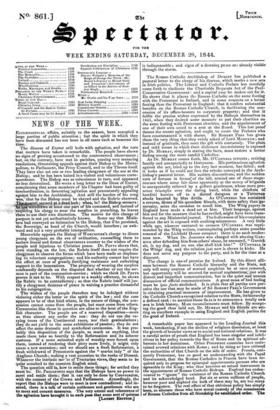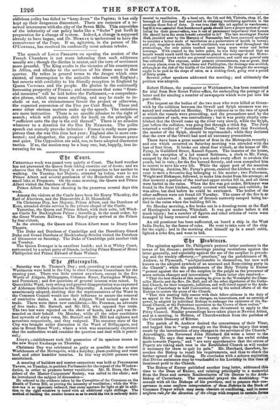A remarkable paper has appeared in the Leading Journal this
week, betokening, if not the decline of religious dissension, at least the growth of broader views as to social and national relations. It was a careful series of proofs that England has been singular and infeli- citous in her policy towards the See of Rome and its spiritual ad- herents in her dominions. Other Protestant countries have main- tained avowed relations with Rome ; and by doing so have enlisted the authorities of that Church on the side of order. Prussia' emi- nently Protestant, has so good an understanding with the Papal Government, that the Roman Catholics in Prussia have been re- quired only to propose for episcopal appointments persons who are agreeable to the King; who thus becomes an actual instrument in the appointment of Roman Catholic Bishops. Englend has endea- voured to "ignore" the existence of the Roman Catholic Church and its acknowledged head. But six or seven millions of people, however poor and slighted the bulk of them may be, are too many to be forgotten. The real effect of that oblivious policy has simply been, to alienate those who have moral custody of the consciences of Roman Catholics from all friendship for established order. The oblivious policy has failed to "keep down" the Papists; it has only kept up their dangerous discontent. There are rumours of a re- newed intercourse with the city of the Seven Hills. This exposition of the inferiority of our policy looks like a "feeler" put forth in preparation for a change of system. Indeed, a change is supposed already to have begun, and Dr. Munn AY is understood to have the concurrence of the Pope. If so, agitation, in the person of Mr. O'CONNELL, has received its confessedly most solemn rebuke.























 Previous page
Previous page